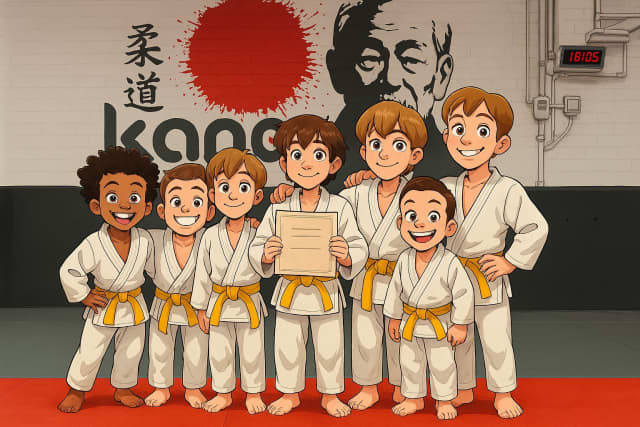Kano Tournai Dojo Receives the Green Dojo Kiai Certification
The Green Dojo initiative, spearheaded by the International Judo Federation and overseen by Larisa Kiss, Director of the Olympic Games and Olympic Movement for Judo, continues to expand with new dojos embracing sustainable values. Among the most recent to join this environmentally conscious community is the Kano Tournai Dojo in Belgium. We spoke with Sébastien Bonte, president of the dojo, to gain insight into what this achievement means for him and his students.
“For us, this recognition is a tremendous source of pride. It validates choices we made a decade ago when we moved into our current space,” Bonte explained. “Back then, opting for LED lighting was a significant financial investment. We also decided on a wooden structure, energy-saving showers, and encouraged recycling. We gave reusable gifts such as water bottles and chose a central city location to encourage sustainable transportation. This certification reinforces that those decisions were the right ones.”
At the heart of the dojo’s philosophy is the belief that judo is more than a sport—it’s a way of life. “Respect is a core value in judo, and that respect must extend to the environment,” he continued. “It made complete sense to create a dojo that reflects those ideals. The ecological measures we adopted aren’t just practical—they are an extension of the teachings of judo itself. They’re long-term and educational.”
According to Bonte, one of the most powerful aspects of this recognition is the potential to shift perceptions within the sporting world. “By proudly sharing this certification, we’re showing that any dojo, regardless of size, can make a difference. It encourages others to take action and sets in motion a broader movement toward sustainability in our sport.”
For those clubs unsure of how to begin, Bonte offers reassuring advice: “Don’t be intimidated. Start with small, manageable actions. Many of them are low-cost and highly impactful. The benefits extend far beyond environmental gains—they strengthen the club’s identity and bring the community together. It’s a meaningful journey.”
His students have embraced the message wholeheartedly. “When I told them we’d earned the Green Dojo Kiai certification, they were truly thrilled. It created a deeper connection to the dojo—they feel proud to belong to a place that stands for something bigger. They understand that judo’s moral code applies in all aspects of life, not just on the tatami. Being a judoka also means being a responsible, aware citizen.”
While external feedback from partners is still forthcoming, Bonte is optimistic about the future. “We hope this recognition will open doors to new collaborations, especially with those who share our environmental values. One of our ambitions is to make access to the dojo even more eco-friendly, such as acquiring an electric minibus for transport. We’re actively looking for partners to support that vision.”
The efforts at Kano Tournai are not theoretical—they’ve implemented tangible steps: LED lighting throughout the building, low-energy showers, and a move away from disposable products in favor of reusable glass bottles in their cafeteria. They make an effort to source local products and encourage judoka to walk, bike, or carpool whenever possible.
The Kano Tournai Dojo stands as a powerful example of how sports institutions can lead by example. Like other clubs that have earned Green Dojo status, they demonstrate that the practice of judo extends far beyond training. It involves choices that affect the community and the environment, shaping a future that aligns with the sport’s deepest values. The path forward is challenging, but as Bonte and his team prove, it’s one worth walking—with both purpose and pride.


